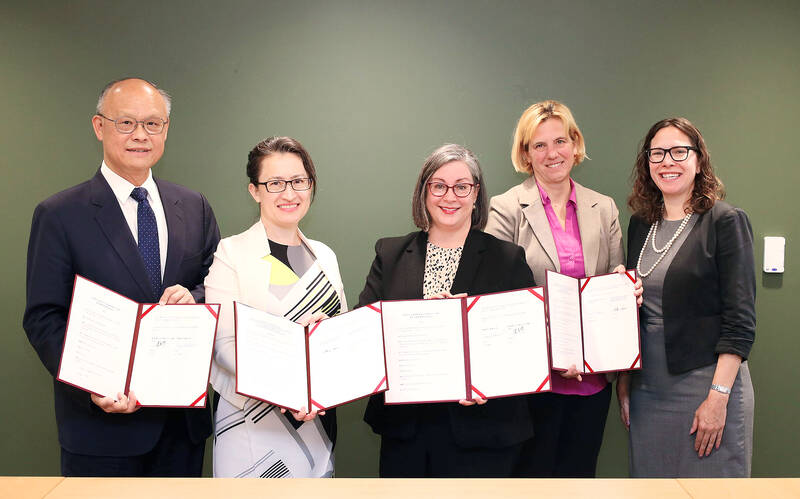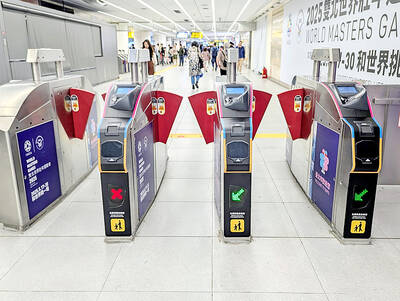Issues in seven areas remain on the agenda for negotiations on the US-Taiwan Initiative on 21st-Century Trade after the two sides signed an initial agreement on Thursday, Minister Without Portfolio John Deng (鄧振中) said.
Deng, Taiwan’s main trade negotiator, said in Washington that talks on labor, environmental and agricultural issues, digital trade, non-market policies and practices, state-owned enterprises and standards remained to be discussed.
During his closed-door talks with US Trade Representative (USTR) Katherine Tai (戴琪) at the APEC Ministers Responsible for Trade Meeting in Detroit, Michigan, last month, it was agreed to begin the next round of negotiations as soon as possible, Deng said.

Photo courtesy of the Office of Trade Negotiations
However, because negotiating all seven topics at the same time could slow down the proceedings, Taiwan is likely to suggest that the two sides focus on environmental, labor and agricultural issues during the next round of negotiations, he said, adding that it was only a preliminary plan and the Office of Trade Negotiations would have to discuss this issue with the USTR.
While acknowledging that forthcoming negotiations would “not be easy,” Deng said the goals of the two sides were aligned.
Taiwan has a well-developed system for protecting workers and labor is an issue to which the US attaches a high level of importance, he said.
In the negotiating mandate for the talks established in August last year, the focus of labor negotiations was to adopt provisions that include protecting internationally recognized labor rights and holding the business community accountable for ensuring those rights, he said.
Talks on the environment should be relatively easy, as environmental protection is a shared goal of the two nations, Deng said.
The mandate envisions provisions that promote green businesses and decarbonization, strengthen environmental protections, including resource conservation, and establish information sharing mechanisms, he said.
The two nations are looking to increase their exports of agricultural products to each other and food safety is also an issue expected to be covered, he added.
In this area, the mandate calls for provisions that facilitate trade “through science and risk-based decisionmaking, and the adoption of sound, transparent regulatory practices” that support cooperation on food safety, Deng said.
As to whether the two sides could conclude the negotiations by the end of the year as the Office of Trade Negotiations hopes, Deng said it would depend on developments related to items on the two sides’ agendas.
In related news, the Ministry of Economic Affairs on Wednesday evening announced that it would create a consultative body for Taiwanese and US small and medium-sized enterprises (SMEs), as was agreed in the initial agreement under the trade initiative.
The ministry said the entity would focus on providing Taiwanese and US SMEs with consultative services to offer them advice on development strategies and the challenges they would face when doing business, a statement said.
The service is to be staffed with experts on Taiwan’s trade with the US, as well as representatives from public foundations familiar with US affairs and SMEs that have proven results in their collaborations with the US, it said.

A magnitude 6.4 earthquake struck off the coast of Hualien County in eastern Taiwan at 7pm yesterday, the Central Weather Administration (CWA) said. The epicenter of the temblor was at sea, about 69.9km south of Hualien County Hall, at a depth of 30.9km, it said. There were no immediate reports of damage resulting from the quake. The earthquake’s intensity, which gauges the actual effect of a temblor, was highest in Taitung County’s Changbin Township (長濱), where it measured 5 on Taiwan’s seven-tier intensity scale. The quake also measured an intensity of 4 in Hualien, Nantou, Chiayi, Yunlin, Changhua and Miaoli counties, as well as

Credit departments of farmers’ and fishers’ associations blocked a total of more than NT$180 million (US$6.01 million) from being lost to scams last year, National Police Agency (NPA) data showed. The Agricultural Finance Agency (AFA) said last week that staff of farmers’ and fishers’ associations’ credit departments are required to implement fraud prevention measures when they serve clients at the counter. They would ask clients about personal financial management activities whenever they suspect there might be a fraud situation, and would immediately report the incident to local authorities, which would send police officers to the site to help, it said. NPA data showed

ENERGY RESILIENCE: Although Alaska is open for investments, Taiwan is sourcing its gas from the Middle East, and the sea routes carry risks, Ho Cheng-hui said US government officials’ high-profile reception of a Taiwanese representative at the Alaska Sustainable Energy Conference indicated the emergence of an Indo-Pacific energy resilience alliance, an academic said. Presidential Office Secretary-General Pan Men-an (潘孟安) attended the conference in Alaska on Thursday last week at the invitation of the US government. Pan visited oil and gas facilities with senior US officials, including US Secretary of the Interior Doug Burgum, US Secretary of Energy Chris Wright, Alaska Governor Mike Dunleavy and US Senator Daniel Sullivan. Pan attending the conference on behalf of President William Lai (賴清德) shows a significant elevation in diplomatic representation,

The Taipei MRT is to begin accepting mobile payment services in the fall, Taipei Rapid Transit Corp said on Saturday. When the company finishes the installation of new payment units at ticketing gates in October, MRT passengers can use credit cards, Apple Pay, Google Pay and Samsung Pay, the operator said. In addition, the MRT would also provide QR payment codes — which would be compatible with Line Pay, Jkopay, iPass Money, PXPay Plus, EasyWallet, iCash Pay, Taiwan Pay and Taishin Pay — to access the railway system. Currently, passengers can access the Taipei MRT by buying a single-journey token or using EasyCard,